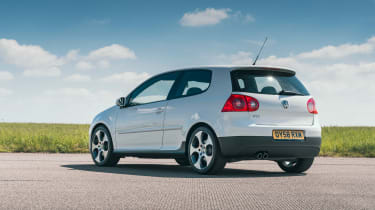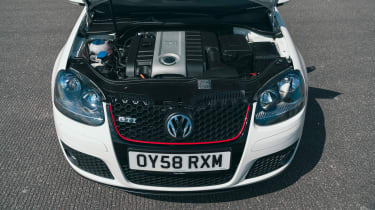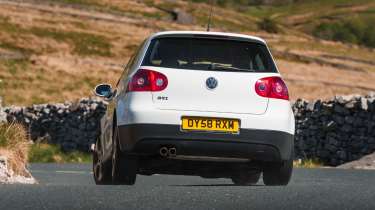Used Volkswagen Golf GTI (Mk5, 2004 - 2009) review – one of the best VWs of the last 30 years
Volkswagen's quintessential hot hatch saw a stunning return to form in Mk5 guise. It’s aged like a fine wine and is an appreciating modern classic today
The Mk5 Golf GTI was pivotal for the future of Volkswagen performance cars. Following the blunt, flat-footed Mk4, the GTI badge was in desperate need of a renaissance, and the Mk5 burst through the gloom in 2005 as one of the finest every-day performance cars of its time.
It captured the understated brilliance that defined the Mk1 and Mk2 before it; more exciting hot hatches have come and gone, but few blend seamless usability with honest, analogue fun quite as well as the Mk5 GTI.
Indeed there was nothing groundbreaking about it. It just did everything really well – thoroughly engineered down to the finest details, resulting in a car that felt like it was three generations ahead of its direct predecessor. To this day it’s hailed as one of the all-time great GTIs and one of the very best cars Volkswagen has produced in the last 30 years. This icon of its period was a perfect fit for our ‘evo Eras: the 2000s’ test.
History
On the Volkswagen stand at the Frankfurt motor show in 2003 there was a car labelled ‘Golf GTI Design Study’, which was, as is the way of these things, actually the finished product, give or take a bit of under-bonnet trim.
More reviews
Senior engineers promised a return to form, a driver’s car worthy of the badge and, frankly, it was long overdue, the last great Golf GTI having been the Mk2. The Mk3 was GTI in badge only, and despite having four attempts at making a satisfying driver’s Mk4 Golf – the lacklustre 115bhp GTI, soulless 150bhp 1.8T GTI, lazy V5 and character-rich but nose-heavy R32 – some failed to hit the board, let alone trouble the bullseye.
The proliferation of different Golfs was typical of VAG at the time, evidence that in Ferdinand Piëch there was an engineer steering the company. It was an exciting time, the company’s portfolio ranging from the the Bugatti Veyron to eventually, the super-frugal VW XL1, with plenty of intrigue in between, including the Volkswagen W12, ‘the people’s supercar’, which covered 4402 miles at an average speed of 183.45mph in 24 hours at Nardo and was ‘production ready’ but didn’t take the final step.
Then there was the VW Phaeton, Piëch’s pet project, intended to stick it to Mercedes and BMW for encroaching on Volkswagen’s heartland. At best it ended up being an organ donor for the Bentley Conti GT. Meanwhile, unusual engines were turning up in unusual places, like the W8 in the Passat. Happily, there was a no-nonsense focus to the creation of the Mk5 Golf GTI – nothing fancy.
Engine, gearbox and technical highlights
This started with the drivetrain, which ditched the near-ubiquitous yet anodyne 20-valve 1.8T engine in favour of a new 2.0 TFSI turbocharged four-cylinder with its direct injection system, producing 197bhp at 5100rpm and 207lb ft from 1800rpm to 5000rpm. Transmissions were either a six-speed manual or a new-fangled six-speed paddle-operated DSG dual-clutch.
> Volkswagen Golf GTI Edition 50 – specs and initial driving impressions
The chassis was a major focus too, engineers at one stage considering a specific chassis tune for the UK. It wasn’t necessary. The beam axle at the back of the car was replaced with a multi-link set-up, as popularised in the Ford Focus and Honda Civic, with MacPherson struts at the front.
The overall platform – the PQ35 that also ended up underpinning the Mk2 Audi TT – was a much stiffer, sturdier basis from which to work. Rear anti-roll bars were 20 per cent stiffer than the standard Golf, while overall ride height was 15mm lower.
Driving the Mk5 Volkswagen Golf GTI
In late 2004 we got to drive a German-registered car on some of our favourite local roads, and it didn’t take long to realise that Volkswagen had nailed the GTI brief.
The basics are just right before you’ve even turned a wheel; the seat is mounted low and holds you firmly at the sides, the steering wheel extends far out to meet you and the golf ball gear knob falls perfectly to hand. Everything feels easy – mundane, even – at low speeds, and while it doesn’t provide the immediate gratification of a Mégane R26.R, there's depth to the GTI as you dig deeper into its abilities.
> Volkswagen Golf GTI Clubsport Mk8.5 2025 review – a cut-price Honda Civic Type R?
The EA113 turbocharged four pot feels organic and effervescent, delivering it's 197bhp with an enthusiasm that's missing from some modern day hot hatches. Sure, a modern diesel saloon would have no trouble keeping pace with a Mk5 today, but the Golf makes you work for its full potential rather than serving it on a plate. Thankfully, the gearshift – while not as tactile as a contemporary Civic Type R's – is free and light across the gate, making it easy to find a rhythm with the engine.
The chassis is the star, though. Being softer-edged than some rivals of the period, there’s scope to hustle the Golf and really work all four tyres at road speeds, using weight transfer to bring the car alive and on its toes. You can lean on it all the way through a corner with the inside rear tyre skimming the ground, at which point the GTI is energised and responsive to your inputs; adding throttle settles the rear, with a gentle lift pivoting the car around the apex. This isn’t a point-and-shoot hot hatch, but one where the driver can make a difference; and that certainly couldn’t be said for the Mk4.
‘I have to declare an interest. I’ve owned a Mk5 Golf GTI for 12 years and over 130,000 miles. It drives well but it’s a bit scruffy, so we borrowed this three-door from the VW UK heritage fleet. It has just 6000 miles on the clock.
‘I defer to my colleague, James, who drove it up here. ‘If this was launched today with these exact same ride and handling characteristics, we’d all be pretty impressed. The ride is quite firm but it is a hot hatch after all, and the way it gets down the road is really well resolved. Somehow you always have plenty of time: to adapt, or adjust your line. It’s very calm, very stable under braking with a responsive front end – to me the nose feels a bit keener than in later Golfs but the rear is still very stable. It changes direction really nicely. Its engineers really achieved something very impressive with this car.’
‘Unsurprisingly, I totally agree. It’s fresher than mine of course, sharper too, in part because it has the optional 18s, and the way it covers the ground is sublime. Nothing could get down this road much faster, yet as well as being agile it is, as James says, utterly unflappable. Its mid-corner poise is remarkable, like it slows everything down, which I reckon is a tell-tale of Nürburgring development time.
‘The designers and engineers got so much right elsewhere too, including fantastic seats that give terrific support and comfort (plus a nod to the original GTI in their plaid cloth) and an engine that delivers more than the on-paper numbers suggest, with enthusiasm. Yes, the cabin is a bit plain, but what a brilliant return to form. Once again, the company that invented the genre owned it.’ – John Barker, evo editor-at-large, who tested the Mk5 Golf GTI on the evo eras: 2000s test against other icons of the period.
Buying checkpoints
The Mk5 has also proved to be reliable nearly two decades since its launch, but as ever with an older performance car, mechanical niggles can emerge through years of use and abuse. Andy McLeish is one of the technical gurus at APS in Brackley; VW-trained, he has decades of experience and takes us through some of the points to look for. ‘Generally, the Mk5 GTI is a pretty bulletproof car,’ he says, ‘but there are a few areas to check.’
Powertrain
While the GTI’s engine is excellent, it is also inherently noisy. Beyond the mechanical thrash, there are one or two sounds to listen out for – one of which is a rattle that disappears soon after start-up but reappears a couple of miles later, which could indicate a problem with the camshaft-driven fuel pump.
The turbo’s diverter valve (dump valve) uses an electronically controlled rubber diaphragm to dump charge air back into the intake system. The diaphragm can split, though, leading to a loss of boost and a fault light on the dashboard. The engine cover houses the air filter and it can be a pain to remove, leading to broken covers. While this doesn’t cause problems, a replacement cover can be expensive. Coil packs tend to fail in groups, so a misfire could be a telltale that the packs are on their way out.
Changing the timing belt can be awkward, as the exhaust downpipe has to be removed to get access. If the bolts come out with no trouble, then it’s a straightforward job; if not, they need drilling out. APS recommends changing the water pump and thermostat at the same time (every 70,000 miles or four years). APS also strongly recommends an oil change every year or 10,000 miles to prevent the oil from degenerating and causing problems.
The six-speed manual transmission shouldn’t give you any worries. However, a heavy clutch indicates that a replacement is due. The DSG gearbox should be smooth and effortless, but a complete service history is crucial. If it hasn’t been looked after properly, it can hang on to gears, hunt around and give very jerky changes. ‘Anything wrong will be expensive to remedy,’ warns Andy.
Chassis suspension and bodywork
The Mk5 can suffer from uneven tyre wear, particularly at the rear because of the amount of suspension adjustment available. If the rear camber and toe angles are incorrect, the inner edges of the tyres will wear far faster than the centre sections or outer edges, which could necessitate new rubber. The rear bushes on the front wishbones can become weak, too, which can lead to the caster angle changing and feathering on the inside of the tyres.
There have also been issues with rear springs breaking, so check for an uneven stance. This is not a disaster, though, as springs are readily available and a straightforward repair. As with other Volkswagens of the period, the body is very well put together. Just make the usual checks for consistent panel gaps and paint colour to ensure the car hasn’t been pranged.
Interior
The interior is well built and uses quality materials, but make sure the condition matches the mileage.
‘Air conditioning compressors can fail,’ warns Andy, ‘so always check the air con works. If it doesn’t, it could be a high-pressure switch or it could be the compressor – originals can be expensive.’
What to pay
Plentiful supply means that the used market is highly competitive, and it’s possible to bag a Mk5 GTI with sensible mileage for as little as £7000 – or around half as much as a brand new Volkswagen up!...
Speaking of mileage, given how usable and untaxing the Mk5 is to drive, there are hordes of leggy examples out there – and the best-kept cars tend to stand out. Sub-50,000 mile GTIs cost upwards of £10,000, with clean Edition 30 models – built to celebrate thirty years of the GTI badge and packing an uprated 227bhp engine – priced even higher. There’s a roughly equal selection of DSG and manual options to choose from, so you’re likely to secure the right car whatever your preference.
Volkswagen Golf GTI Mk5 specs
| Engine | 2-litre turbocharged 4cyl |
|---|---|
| Power | 197bhp |
| Torque | 207lb ft |
| Weight | 1328kg |
| Power-to-weight | 148bhp/ton |
| 0-62mph | 7.2sec |
| Top speed | 146mph |
| Price new | £19,995 |
| Value today | from £8000 |











